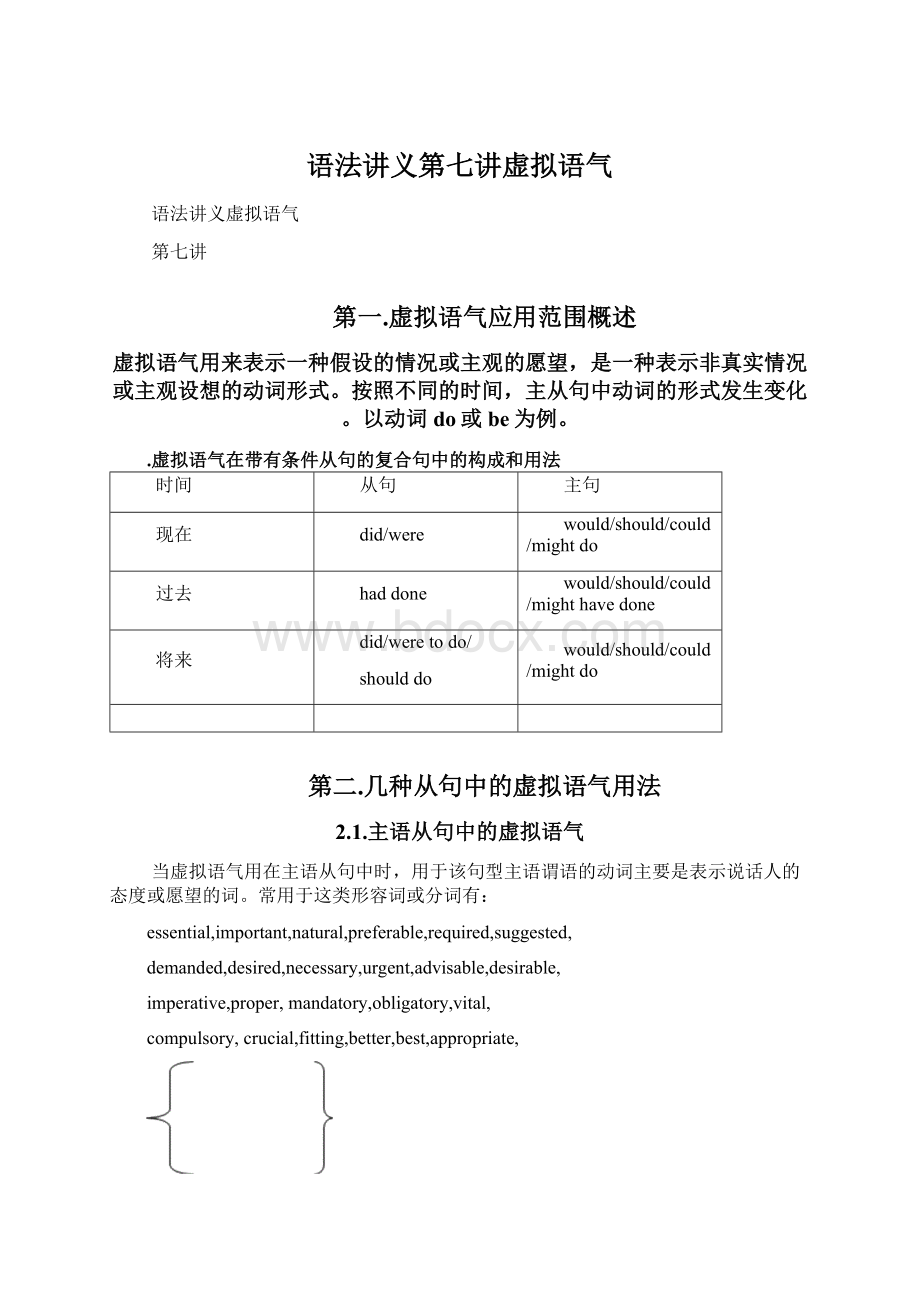语法讲义第七讲虚拟语气Word格式.docx
《语法讲义第七讲虚拟语气Word格式.docx》由会员分享,可在线阅读,更多相关《语法讲义第七讲虚拟语气Word格式.docx(11页珍藏版)》请在冰豆网上搜索。

recommended,requested等。
该类虚拟语气的句型为:
essential
Itis/was+urgent+that+主语+(should)+动词原形
suggested
Itisurgentthatanewlaw(should)beenactedtoprotectchildren.
目前迫切需要制定一项法律来保护儿童。
[例]Itisrecommendedthattheprojectuntilallthepreparationshavebeenmade.
[a]notbestarted[b]willnotbestarted
[c]isnotstarted[d]isnottobestarted
[例]Itismostdesirablethathetheconference.
[a]attends[b]istoattend
[c]willattend[d]shouldattend
2.2.同位语从句及表语从句中的虚拟语气
在表示建议、命令、主张、目的、愿望等名词后面的表语从句和同位语从句中,谓语要用虚拟语气,即“should+动词原形”。
这类名词常见的有
suggestion,proposal,motion,order,pray,request,
recommendation,requirement,idea,aim,wish,plan,
demand,decision,preference,necessarity,resolution,desire等。
AnyproposalsthatJohnshouldbedismissedmustberesisted.
必须抵制任何开除约翰的提议。
Oursuggestionisthatwe(should)putonaplayattheEnglishevening.
我们建议在英语晚会上演一个剧。
[例]JohnWagner’smostenduringcontributiontothestudyofAfroAmericanpoetryishisinsistencethatitinareligious,aswellasworldly,frameofreference.
[a]istobeanalyzed
[b]beanalyzed
[c]hasbeenanalyzed
[d]shouldhavebeenanalyzed
[例]Thefinalrecommendationwasthattheemployeeonprobationaspecialnightclassforonesemester.
[a]hasattended[b]attended
[c]attends[d]attend
2.3.宾语从句中的虚拟语气
用在表示愿望、请求、建议、命令等动词的宾语从句中的虚拟语气。
英语中有些表示“提议、主张、要求、命令、需要”等概念的词语,本身隐含说话者主观的意见,认为某事“该(如何)”或“不该(如何)。
因此,这些词语后面的that从句应采用“虚拟语气”,而且“that从句”中以should表示这种语气。
但在实际应用中(尤其是美国英语中),“that从句”should常被省略,因此从句中的动词短语可能只出现原形动词。
其句型为:
主语+suggest(ed)/insist(ed)+that+主语+(should)+动词原形.
Isuggestthatwe(should)adoptadifferentpolicy.
常用于该句型主句谓语的动词主要有:
表示“提议”的动词suggest,propose,recommend,move等
表示“主张”的动词insist,maintain,hold,urge等
表示“要求”的动词ask,request,require,demand,desire等
表示“命令”的动词order,command等
表示“忧虑”的动词或短词:
dread,fear,tremble,beafraid等
{注}:
该句型中的主句的谓语动词无论采用“现在式”或“过去式”,其后的“that从句”固定以“should+动词原形”
[例]Wedesirethatthetourleaderusimmediatelyofanychangeinplans.
[a]inform[b]informs
[c]informed[d]hasinformed
[例]Heaskedheanopportunitytoexplainhiscase.
[a]begiven[b]gives
[c]isgiven[d]shouldgive
2.3.1.动词wish后宾语从句中的虚拟语气
wish后宾语从句中的虚拟语气。
在这种句型中,宾语从句表示与主句谓语动词同时存在或先于主句谓语动词存在的与事实相反的情况,或将来不太可能实现的愿望。
S+wish+
that+S+
过去式(be动词用were)……
同时的情况
had+过去分词……
先于的情况
that+S+
would
+动词原形……
将来的愿望
should
could
might
Iwishthatheweren’tsolazy.
Iwishthathehadnotmadesomuchfussaboutit.
但愿那时他对这件事不那么大惊小怪。
Iwishthattherainwouldstop.
要是雨能停下来就好了。
[注]在“Itiswishedthat”句型以及wish做名词所引导的表语和同位语从句也要求虚拟语气,形式同以上句型。
[例]IwishIlongerthismorning,butIhadtogetupandcometoclass.
[a]haveslept[b]slept
[c]mighthaveslept[d]couldhaveslept
[例]Iwishyoulikethat.
[a]don’ttalk[b]won’ttalk
[c]wouldn’ttalk[d]nottotalk
[例]Iwishyouwithustomorrow.
[a]wouldgo[b]didgo
[c]hadgone[d]willgo
23.2.wouldrather,hadrather,would(just)assoon,wouldsooner,wouldprefer,等后宾语从句中的虚拟语气
wouldrather,hadrather,would(just)assoon,wouldsooner,wouldprefer等后宾语从句中的虚拟语气.该句型中的虚拟语气实质上是“had,wouldrather”等词代替了wish.
该宾语从句往往省略that,从句的主语和主句的主语不是同一个(些)人时,该句型表示希望或婉转的责备,从句动词用过去式表示当时或将来的情况;
用过去完成时表示过去的情况,意味“宁愿某人做某事”
I’dratheryoupostedtheletterrightaway.
我倒希望你把这封信立即寄出。
Iwouldpreferhedidn’tstaytheretoolong.
我倒希望他不要在那儿待得太久。
Iwouldjustassoonyouhadreturnedthebookyesterday.
我真希望你昨天把这本书还了。
此外,该句型还用于以下情况:
1.接动词原形时,表示现在或将来时间,表示一种主观愿望或选择。
I’dratherdoittoday.
我宁愿今天做这件事。
LiuHulanwouldsoonerdiethansurrender.
刘胡兰宁死不屈。
2.接不定式完成式,表示过去的某种选择不恰当。
I’drathernothavetoldherthenews.Sheissuchagossip.
我宁愿没有告诉他那消息,她真是长舌妇。
[例]I’dmuchratherthatyoutomorrowthantoday.
[a]came[b]willcome
[c]hadcome[d]iscoming
2.4.状语从句中的虚拟语气
2.4.1.目的状语从句中的虚拟语气
在forfearthat,inorderthat,sothat,lest,incase(that)引导的目的状语从句中,谓语动词一般用虚拟语气,从句谓语动词用should(could,might)+动词原形。
在以lest引导的从句中,谓语动词用“(should)+动词原形”。
Iremindedhertwiceofitlestsheshouldforget.
我提醒她两次,怕她忘了。
IwillnotmakeanoiseforfearthatIshoulddisturbhim.
我不会做声的,以免打扰他。
Heputhiscoatoverhissonincaseheshouldcatchcold.
他把大衣盖在儿子身上以免他着凉。
[注]:
如果inorderthat和sothat前的主句是现在时,其后的从句有时亦可用can,may+动词原形.
AskhimtohurryupwiththeletterssothatIcansignthem.
让他带着信赶快来以便我签字。
[注]:
在以lest,incase引导的目的状语从句中的谓语动词若属于过去时,一般要用虚拟语气:
“(should)+动词原形”;
若谓语动词不是过去时,也可以用陈述语气。
Takewarmclothesincasetheweatheriscold.
带上厚衣服以防天变凉。
[例]GivemeyourtelephonenumberIneedyourhelp.
[a]whether[b]unless
[c]sothat[d]incase
[例]IdidthissothatIacoupleofweekstopreparemypaper.
[a]mayhave[b]mighthave
[c]canhave[d]hadhad
2.4.2以asthough和asif引导的方式状语从句或表语从句中的虚拟语气。
(1)asthough与asif意义相同,都表示“似乎,”“好像”之意,但以asif较为常用。
它们引导的从句表示一种想象的状态,因此,从句的谓语大多用过去式,是一种虚拟式,并不限于实际时间。
从句表示与现在事实相反,谓语动词用“一般过去式”;
如果要表示与过去事实相反,则用“had+过去分词”;
当表示将来的可能性不大时,则用would/might/could+动词原形。
有时主句的谓语也用seem,look等感觉动词,仍旧表示一种弱式的判断。
IfeelasifIweretenyearsyounger.
我觉得仿佛年轻了十岁。
Hetalksaboutpyramidsasthoughhehadseenthemhimself.
他谈起金字塔来,就好象亲眼见过似的。
Ifeel(felt)asifwehadknowneachotherforyears.
Itlooksasifitmightrain.看上去好象要下雨。
(2)在asif后面可以直接跟不定式,这是一种简缩用法。
“Heopenedhislipsasiftosaysomething.”
此外,在现代英语中,如果主句使用seem,look,sound,taste,feel,smell等感觉动词时,asif后面的谓语动词也可以用现在时。
“Itlooksasifoursideisgoingtowin.”
Itlooksasifit’sgoingtorain.
2.5.定语从句中的虚拟语气
“Itis(about,high)time+that…”句型中的虚拟语气。
在“Itis(about,high)time”that引导的定语从句中,也可以根据需要使用虚拟语语气,用以表示早该做而未做的事情,含有建议的意味,其动词形式通常用过去式或should+动词原形(用should时,不能将其省略),意思则指现在或将来,that可以省略。
It’stimeyouturnedinforthenight.
你该去睡觉了。
It’stimethatshegaveuphergirlishmannerism.
她不该再装模作样地装小姑娘了。
It’shightime(that)webegantowork.
咱们该开始工作了。
It’stimeIshouldleave.
我该走了。
[例]It’stimeaboutthetrafficproblemdowntown.
[a]somethingwasdone
[b]anythingwillbedone
[c]everythingisdone
[d]nothingtobedone
[例]It’shightimethatweoff.
[a]are[b]willbe
[c]hadbeen[d]were
第三.特殊虚拟语气精讲
3.1.错综时间条件句中的混合式虚拟语气
“If+主语+had+ved2+…,主语+
+动词原形…”
注1:
该句型属于混合式的虚拟语气,条件从句表示与过去事实相反,主句则表示与现在事实相反。
注2:
该句型表明:
我们可以根据“现在事件”对“过去事件”进行假设或推断。
Ifithadnotrainedlastnight,thegroundwouldnotbesomuddythismorning.
如果昨天晚上没下雨,今天早上地就不会这么泥泞。
Ifwehadleftalittleearlier,wewouldn’tbewalkingintherainnow.
如果我们早一点出发的话,我们现在就不会冒雨行进了。
[例]IfyouJerryBrownuntilrecently,you’dthinkthephotographontherightwasstrange.
[a]shouldn’tcontact[b]weren’ttocontact
[c]didn’tcontact[d]hadn’tcontacted
[例]YouabletospeakEnglishsowellifyouhadn’tbeenpracticinghard.
[a]arenot[b]cannotbe
[c]wouldn’tbe[d]wouldhavebeen
3.2.含蓄的虚拟条件
虚拟的条件,不一定是if直接引导,有时可以用以下的表达法。
1)介词with,without,under,butfor,but(that),inthepast(要是在以往)等引导的介词短语:
Withhisaid,youwouldsucceed.
如果有他的帮助,你就会成功。
Plantswoulddiewithoutwaterontheearth.
地球没有水,植物就都会死。
Butforthefogwewouldhavereachedourdestinationlongago.
要是不下雾的话,我们很早就到达目的地了。
Undermorefavorableconditionswecouldhavefinishedthetask.
如果条件对我们更有利些,我们就会把工作完成的更好。
2)不定式短语作状语。
TohearhimspeakEnglish,onewouldtakehimforanEnglishman.
听他说英语,真以为他是个英国人呢。
Hewouldbestupidnottoacceptthatoffer.
如果他不接受那项建议,那真是太蠢了。
Itwouldbeamistakenottohelphim.
不帮助他将是一个错误。
3)分词短语。
Thissamething,happeninginwartime,wouldamounttodisaster.
如果同样的事情发生在战时,就等于一场灾难。
4)定语从句和状语从句。
Anyonewhohadmarriedsuchagirlasshewouldhavebeenregretful.
谁娶了象她这样的姑娘都会后悔的。
Helpwaspromisedwhereitshouldbecomenecessary.
要是需要的话,就答应给予帮助。
[例]Wedidn’tknowhistelephonenumber;
otherwisewehim.
[a]hadtelephoned
[b]wouldtelephone
[c]musthavetelephoned
[d]wouldhavetelephoned
[例]talk,onewouldtakehimforafool.
[a]Onhearing[b]Beingheardto
[c]Heardto[d]Tohearhim
3.3.but或butthat表达的含蓄条件的特殊含义。
but或butthat作“如果不、、、”解,语义相当于“ifnot”,其后面不可接虚拟式,应接陈述式的现在时动词或过去时动词,即“butthat+主语+现在时动词/过去式动词”,而主句要用虚拟式。
Butthatyouhelphim,hewouldfail.
如果没有你的帮助,他会失败的。
Butthatyouhelpedhim,hewouldhavefailed.
如果没有你的帮助,他早就失败了。
[例]ButIfullyoccupiedthewholeoflastweek,Iwouldhavegonetovisithiminthehospital.
[a]were[b]hadbeen
[c]havebeen[d]was
3.4.ifonly后的从句谓语动词要用虚拟语气,表示愿望,意为“但愿”,相当于wish。
用“过去时或would+动词原形”表示与现在或未来事实相反,
用“过去完成时”表示与过去事实相反。
Ifonlyweknewwheretolookforhim!
我们要是知道到哪里去找他就好了!
IfonlyIhadlistenedtomyparents!
要是我听取了父母的话多好啊!
[例]LookattheterriblesituationIamin!
IfonlyIyouradvice.
[a]follow[b]hadfollowed
[c]wouldfollow[d]havefollowed
[例]IfonlyItheexamination!
[a]havepassed[b]pass
[c]willpass[d]passed
3.5.suppose等词后句中及whatif句中的虚拟语气
suppose/supposing,imagine,whatif引导的条件句,可以表示现在或将来非现实情况的意思、态度(用were型结构),也可以表示过去非实际情况的意思(用had+过去分词结构)。
Imaginethatwewereonadesolateislandnow.
设想一下我们现在在一个渺无人烟的荒岛上。
----“Mum,canIlistentotheradio?
”
----“Supposeyoudidyourhomeworkfirst?
妈妈,我可以听收音机吗?
假如你先做完作业的话,就可以。
Supposeyouhadnothadtakenthosemeasures,whatwouldhavehappened?
假如你没有采取那些措施,将会发生什么事情呢?
Whatifyoucametomorrowinsteadoftoda